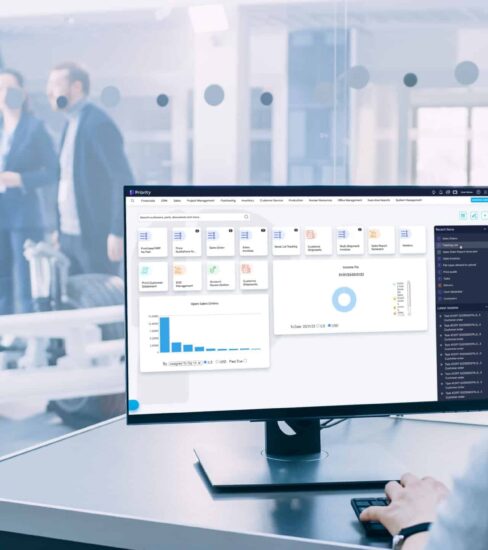When it comes to efficiently managing a manufacturing business with multiple departments, processes, and datasets, implementing a comprehensive Enterprise Resource Planning (ERP) system is essential.
An ERP system provides a unified and centralized platform that integrates and streamlines all core business functions, including inventory and supply chain management, production planning and scheduling, financial management, customer relationship management, and human resources.
By implementing a manufacturing ERP system, businesses can enhance collaboration and communication among departments, reduce errors and redundancies, and gain valuable insights into performance metrics to make data-driven decisions. A robust ERP system can help manufacturing businesses improve their operational efficiency, increase productivity, and boost profitability while ensuring that the company remains competitive and can keep up with the rapidly developing market.
This article discusses manufacturers' challenges and how a modern ERP solution can improve operations by providing real-time insights, breaking down data silos, and increasing adaptability.
Streamlining Operations:
Traditional manufacturing processes often relied on separate systems, manual data entries, and inconsistent workflows, leading to mistakes and delays. Modern ERP systems pull everything together, from inventory and production to sales and finance. For example, where order processing once took multiple steps and manual checks, an ERP can simplify and automate the process, cutting down on errors and saving time; for instance, when there's an unexpected surge in orders for a particular product, an ERP can promptly ( and automatically) alert the production and logistics teams, ensuring timely fulfillment.
Real-time Visibility and Control:
In the fast-paced manufacturing environment, where market conditions can shift rapidly, having real-time insights into your business is crucial for making informed decisions. An ERP system acts as the nerve center of a manufacturing enterprise, continuously collating and analyzing data from various sources.
A modern ERP solution allows access to centralized dashboards that provide up-to-date information across all departments. Whether tracking production status, monitoring inventory levels, or analyzing sales trends. This real-time overview empowers manufacturers to respond to emerging trends and challenges proactively. In a scenario where a specific component's supply dwindles due to unexpected global events, an ERP system can provide immediate insights into the situation, enabling manufacturers to source alternative parts or adjust production schedules to mitigate potential disruptions.
Collaboration and Cohesion: Breaking Down Data Silos.
Data silos from different departments relying on separate software solutions pose a significant barrier to effective decision-making. This lack of integration often challenges accessing and analyzing comprehensive data, causing miscommunication and missed opportunities. A modern ERP system addresses this issue head-on by integrating all aspects of the manufacturing business onto a single platform. This unification not only eradicates data silos but also fosters a collaborative environment. Whether it's the sales team updating customer feedback, market demands, or the R&D team working on product development, everyone operates from a unified data source. This seamless data sharing and collaboration between teams enhance transparency and ensure that all departments can access and act on real-time information, creating a more cohesive and efficient work environment.
Adaptability to Market Changes:
In today's dynamic business landscape, manufacturers face rapidly shifting market conditions and evolving consumer preferences. Whether technological breakthroughs or a growing global focus on sustainability, staying agile and ahead of the curve is essential. Modern ERP systems are designed to be flexible, offering customizable tools and modules that can be tailored to address specific challenges or opportunities. For instance, If there is an increase in demand for eco-friendly products, an ERP system can assist manufacturers in adjusting their procurement strategies, sourcing sustainable materials, and launching targeted green marketing campaigns. This adaptability, combined with scalable infrastructure, ensures that manufacturers can quickly respond to changes, whether introducing new products, modifying production processes, or reforming supply chain strategies.
Enhanced Customer Relationship Management:
Maintaining relationships to ensure customer satisfaction is essential for long-term success. In today's digital landscape, consumers are more informed and savvy than ever, making it imperative for businesses to truly understand and anticipate their needs. ERP systems offer integrated Customer Relationship Management (CRM) tools that provide a comprehensive view of customer interactions, preferences, and feedback. This 360° perspective, combined with centralized customer data, order history, and communication logs, allows manufacturers to analyze this data, fine-tune their product offerings, craft tailored marketing strategies, and deliver personalized service. The result? Enhanced customer satisfaction, loyalty, and a stronger bond between the business and its customers.
Improved Cost Control and Financial Management:
Financial stability stands as the cornerstone of a thriving manufacturing enterprise. Effective financial management is paramount in an industry where margins can be tight, and every decision impacts the bottom line. ERP systems rise to this challenge by offering a comprehensive and holistic view of a company's financial health. From tracking daily expenses and managing budgets to forecasting both short-term and annual revenue, these systems ensure that manufacturers have all the financial data they need at their fingertips. The automation of financial processes, coupled with real-time financial reports generated by the ERP, allows manufacturers to swiftly identify areas of wastage, uncover cost-saving opportunities, and pinpoint potential investment avenues. By centralizing and streamlining financial data, ERP systems empower manufacturers to optimize cash flow, minimize unnecessary expenditures, and make well-informed, sound financial decisions that drive business growth.
Future-Proof your Manufacturing operation.
In the manufacturing sector, things move fast. Today's manufacturing landscape demands more than just producing quality products; it calls for agility, foresight, and an in-depth understanding of both market dynamics and customer needs. Manufacturers embrace the notion that suitable IT tools are required to keep up, making modern ERP systems a game-changing necessity.
A modern ERP system offers benefits that go beyond just streamlined operations. It provides real-time insights, ensuring decisions are made based on accurate, historical, and current data. It breaks down data silos, fostering collaboration across departments. Its adaptability ensures that the business can pivot seamlessly as the market changes. Moreover, its enhanced customer management tools ensure that the heart of your business - your customers - is always prioritized.
ERP helps manufacturers grow their businesses by proactively staying ahead rather than just reacting. For manufacturers aiming for excellence, an ERP isn't just an option—it's a strategic advantage.


